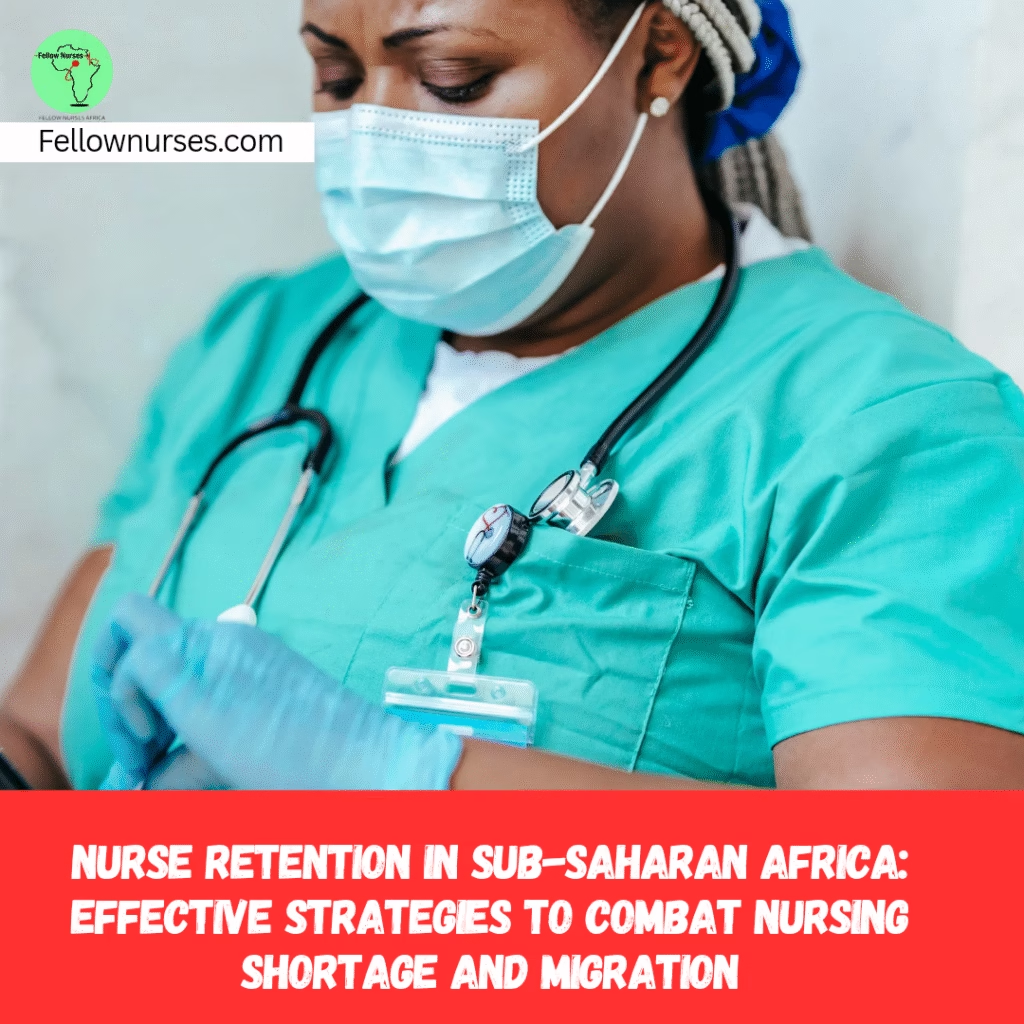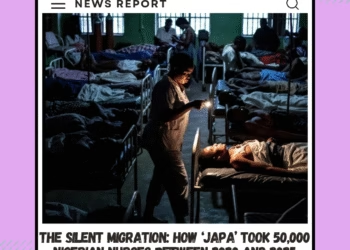
Nurse Retention in Sub-Saharan Africa: Effective Strategies to Combat Nursing Shortage and Migration
By Nurse Umar Rabiu RN, BNSc
The nursing shortage in Sub-Saharan Africa (SSA) is a critical barrier to achieving Universal Health Coverage (UHC) and sustainable healthcare systems. With alarming rates of nurse migration, burnout, and turnover, the region faces a severe healthcare worker crisis that exacerbates the global disease burden. According to the World Health Organization (WHO), the global nursing workforce grew to 29.8 million in 2023, yet a shortage of 4.5 million nurses is projected by 2030, with nearly 70% of this gap concentrated in Africa and the Eastern Mediterranean. Recent studies reveal that nurse retention in SSA stands at a mere 53%, while the intention to stay is only 57%, highlighting the urgency for targeted interventions to retain skilled nurses and mitigate brain drain. Addressing nurse retention strategies in Sub-Saharan Africa is essential for improving health outcomes and building resilient healthcare infrastructures.
The Scope of the Nursing Shortage Problem in Sub-Saharan Africa
Sub-Saharan Africa shoulders 24% of the global disease burden but has only 3% of the world’s health workers. The region’s nurse-to-population ratio averages just 1.8 nurses per 1,000 people (or 18 per 10,000), far below the WHO’s recommended threshold of 4.45 skilled health workers (including doctors, nurses, and midwives) per 1,000 population needed for UHC. In countries like Nigeria, Ethiopia, and Tanzania, ratios dip even lower, with some areas reporting fewer than 1 nurse per 1,000 residents. This disparity contributes to high maternal and child mortality rates, strained emergency services, and inadequate responses to epidemics like Ebola and COVID-19. Factors driving the nursing shortage in Africa include poor working conditions, inadequate pay, and limited resources, pushing over 50% of trained nurses to migrate abroad or exit the profession entirely.
Key Challenges to Nurse Retention in Sub-Saharan Africa
Retaining nurses in SSA requires addressing multifaceted challenges that fuel dissatisfaction and emigration. Here are the primary issues:
-
Poor Remuneration and Incentives
Nurses in SSA often receive salaries insufficient for basic living expenses, with average monthly earnings ranging from $100–$300 in countries like Kenya and Uganda, compared to $3,000+ in high-income nations. This wage gap is a major push factor for nurse migration from Sub-Saharan Africa, leading to job dissatisfaction and pursuit of opportunities in Europe, the UK, and the US. -
Heavy Workload and Burnout
Chronic understaffing results in nurses handling 50–100 patients per shift, working 12+ hour days, and experiencing high levels of emotional exhaustion. Burnout affects up to 60% of nurses in SSA, contributing to a 50% intention-to-leave rate. -
Unsafe and Undignified Work Environments
Many facilities lack electricity, forcing nurses to use phone flashlights during night shifts, endure mosquito bites, extreme heat, and inadequate safety protocols. Outdated infrastructure and poor hygiene further erode morale, with healthcare worker safety concerns amplified during outbreaks. -
Nurses’ Strikes as a Last Resort
Strikes, though rare (occurring once every few decades in some countries), signal deep frustrations over unpaid salaries and unsafe conditions. In 2025, Nigerian nurses launched a nationwide 7-day strike demanding fair pay and inclusion in decision-making, the first in 40 years, crippling services in Africa’s most populous nation. Similar actions in Kenya (2017) and South Africa (2023) highlight systemic failures. -
Limited Career Development Opportunities
Scarce access to training, scholarships, and advancement discourages long-term commitment, with only 20–30% of nurses in SSA reporting adequate professional growth options. -
Migration and Brain Drain
Over 57,000 African health workers migrated to OECD countries between 2015–2020, driven by better pay, security, and prospects. Political instability and family reunification also play roles, costing SSA billions in training investments.
Effective Strategies for Nurse Retention in Sub-Saharan Africa
To combat the nursing shortage and migration, evidence-based strategies must be implemented. Drawing from successful case studies in Nigeria, Rwanda, Zambia, and Ghana, here are proven approaches:
-
Improving Compensation and Incentives
Competitive salaries, housing allowances, and performance bonuses can boost retention by 20–30%. Zambia’s rural allowance program increased nurse stays in remote areas by providing financial top-ups. -
Enhancing Working Conditions
Investing in reliable electricity, ventilation, mosquito nets, and staffing ratios reduces burnout. Rwanda’s infrastructure upgrades, including solar-powered facilities, improved nurse satisfaction and halved turnover rates in pilot districts. -
Investing in Professional Development
Mentorship, scholarships, and training programs empower nurses. Ghana’s rural fit and resilience initiatives enhanced retention through targeted education, with nurses reporting 40% higher job satisfaction. -
Strengthening Policy and Governance
Policies protecting rights and promoting fair recruitment are vital. Nigeria’s recent workforce retention framework includes ethical migration codes and bonding schemes to curb brain drain. -
Encouraging Community and Diaspora Engagement
Partnerships with diaspora nurses provide mentorship and resources. South Africa’s knowledge retention strategy for professional nurses leverages community networks for advocacy and support. -
Promoting Mental Health and Well-being
Wellness programs and counseling reduce stress. Zambia’s community health worker motivation initiatives, including peer support, improved performance and retention by addressing burnout.
| Strategy | Key Benefits | Case Study Example | Expected Impact on Retention |
|---|---|---|---|
| Compensation Incentives | Increases job satisfaction | Zambia’s rural allowances | 20–30% reduction in turnover |
| Working Conditions Upgrades | Reduces burnout and safety risks | Rwanda’s solar facilities | Halved turnover in pilots |
| Professional Development | Enhances skills and career growth | Ghana’s resilience programs | 40% higher satisfaction |
| Policy Reforms | Ensures fair treatment | Nigeria’s migration codes | Curb brain drain by 15–20% |
| Diaspora Engagement | Provides resources and mentorship | South Africa’s networks | Improved advocacy and support |
| Mental Health Programs | Supports well-being | Zambia’s peer groups | Better performance and stays |
Call to Action: Prioritizing Nurse Retention for Africa’s Healthcare Future
The nursing shortage in Africa demands immediate action. Governments, NGOs, and international partners must collaborate on nurse retention strategies in Sub-Saharan Africa to prevent further loss of skilled workers. By investing in fair wages, safe environments, and growth opportunities, SSA can safeguard healthcare delivery and save millions of lives. Retaining nurses isn’t optional—it’s imperative for overcoming the healthcare worker migration crisis and achieving UHC.
Fellow Nurses Africa is the independent voice of African nursing, we educate, inform and support the nursing profession.










